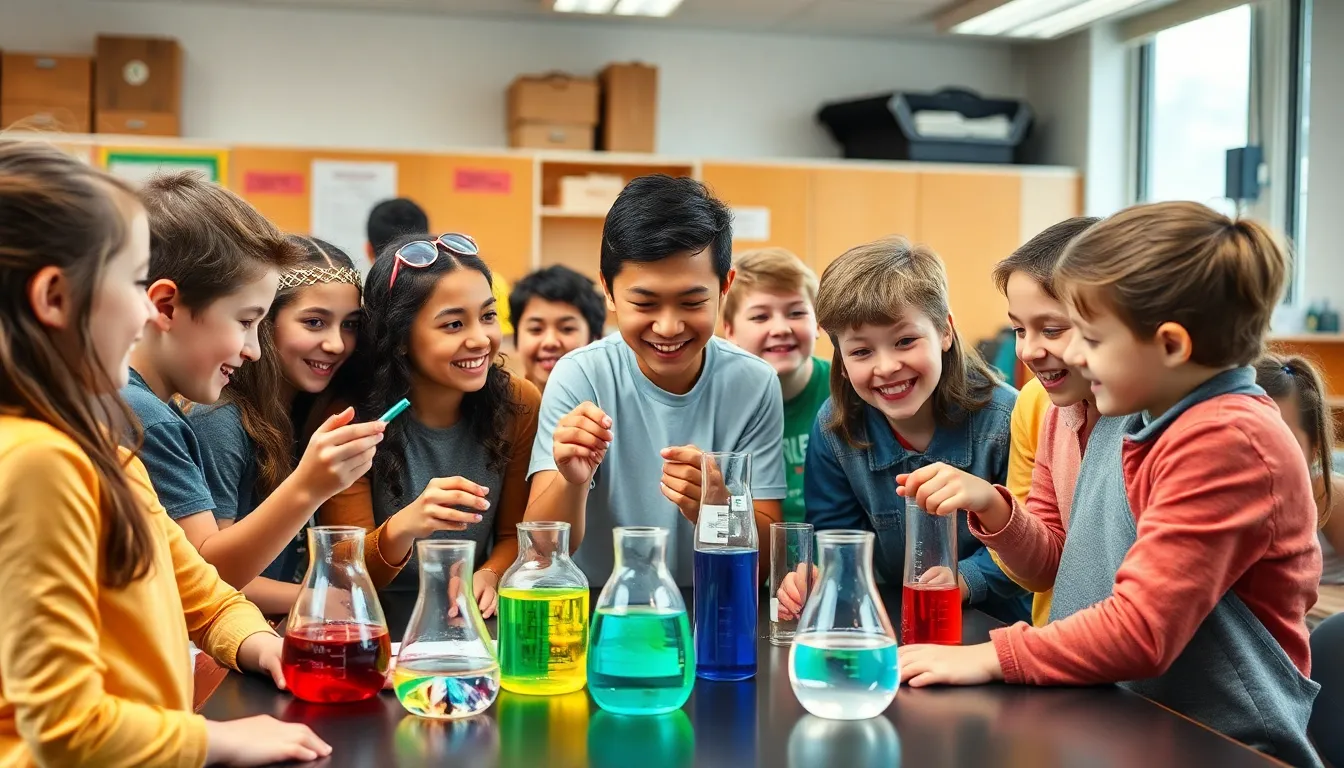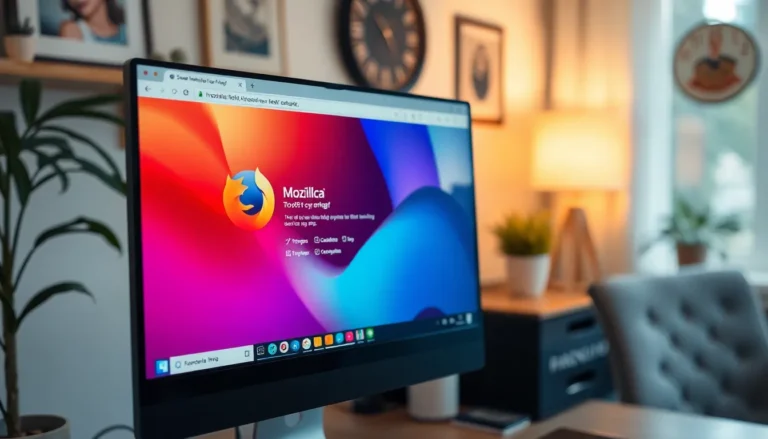Table of Contents
ToggleImagine walking into a classroom where the only thing louder than the chatter is the sound of minds buzzing with curiosity. That’s the magic of discovery learning. Rather than being spoon-fed information, students dive headfirst into exploration, uncovering knowledge like treasure hunters on a quest. It’s engaging, it’s interactive, and let’s be honest—it beats sitting at a desk staring at a textbook.
Overview of Discovery Learning
Discovery learning engages students in an interactive educational experience. This approach encourages learners to explore concepts and ideas actively. Instead of simply memorizing facts, they uncover knowledge through hands-on activities and inquiry-based projects. Challenges in the learning environment become stepping stones for deeper understanding.
Research supports that students retain information better when they discover it independently. Active participation fosters critical thinking skills that are essential in real-world problem-solving. Teachers act as facilitators, guiding exploration rather than directly delivering content. This role reshapes the dynamics of the classroom, promoting collaboration among students.
Activities characteristic of discovery learning include experiments, simulations, and group discussions. For example, conducting a science experiment helps students formulate hypotheses and test results. Exploring historical events through role-playing enables them to empathize with different perspectives.
Effective implementation of discovery learning necessitates a structured environment that balances exploration with specific goals. Classroom settings that provide resources for investigation enhance the learning process. Incorporating technology, such as educational software or online databases, can further enrich the experience.
Assessment methods in this approach often focus on the process rather than just the end product. Teachers evaluate students based on their engagement level, creativity, and the depth of their inquiry. Students may complete self-assessments to reflect on their learning journey, promoting self-awareness.
Overall, discovery learning emphasizes an active role in education, preparing students for continuous learning beyond the classroom.
Key Principles of Discovery Learning

Discovery learning hinges on several foundational principles. These principles guide educators in creating effective learning experiences that allow students to explore and discover knowledge.
Constructivism in Education
Constructivism forms the bedrock of discovery learning. This theory posits that learners construct knowledge through experiences, rather than passively absorbing information. Active engagement in problem-solving enables students to relate new information to existing knowledge. Experiences such as hands-on experiments enhance understanding by providing context. During this process, the teacher’s role shifts to that of a facilitator. Students thrive in environments encouraging exploration and personalized learning paths. Additionally, collaborative activities promote social interaction and diverse perspectives, enriching the learning experience.
Active Learning Strategies
Active learning strategies play a crucial role in discovery learning. Techniques such as group discussions stimulate critical thinking and enhance knowledge retention. Another effective method involves simulations, which allow students to apply concepts in realistic scenarios. Inquiry-based projects invite students to formulate questions, conduct research, and share findings. This active involvement fosters deeper understanding and creative problem-solving skills. Incorporating technology as a resource can further enhance these strategies by providing interactive platforms for learning. Ultimately, these strategies empower students to take ownership of their education and develop lifelong learning habits.
Benefits of Discovery Learning
Discovery learning presents numerous advantages in the educational landscape, enhancing learners’ abilities and engagement. This method not only builds skills but also fosters a deep love for learning.
Enhanced Critical Thinking Skills
Critical thinking skills flourish in an environment where students explore and inquire. Students practice analyzing problems, evaluating solutions, and making decisions through hands-on activities and inquiry-based projects. Engaging in experiments and simulations challenges students to think critically and address real-world problems effectively. They formulate hypotheses, analyze data, and draw conclusions, leading to deeper understanding and mastery of concepts. Discovery learning empowers students to connect their knowledge to tangible situations, fostering independent thought and creative problem-solving. Consequently, the development of these skills equips students for future challenges in academia and beyond.
Increased Engagement and Motivation
Motivation increases dramatically when students are actively involved in their learning process. Discovery learning promotes curiosity, transforming lessons into exciting explorations rather than passive receptions of information. Students feel a sense of ownership over their education, diving into topics that pique their interest. Activities like group discussions and collaborative projects stimulate cooperation and communication, making learning enjoyable and relevant. An engaging classroom atmosphere encourages students to take risks, ask questions, and embrace challenges. As a result, they develop intrinsic motivation, fostering a lifelong enthusiasm for learning.
Challenges and Limitations
Discovery learning presents several challenges and limitations educators must navigate. Structuring an effective learning environment while maintaining exploration can be difficult.
Teacher’s Role in Discovery Learning
Teachers must adapt their roles in discovery learning settings. Instead of merely delivering information, they facilitate exploration. This shift can lead to uncertainty, as the need for guiding questions and support increases. Some educators may lack the training to effectively mentor students through this process. Balancing guidance and allowing for independent inquiry remains a challenge. Meanwhile, the extent of student engagement significantly influences the learning outcomes. When students actively explore, they gain knowledge, but their focus can waver without appropriate support.
Assessment Difficulties
Assessing student progress in discovery learning poses unique difficulties. Traditional metrics often do not capture the depth of inquiry and engagement involved in this approach. Finding methods that genuinely reflect students’ critical thinking and problem-solving skills is essential. Performance-based assessments, such as projects and portfolios, provide better insights but can require more time to evaluate. Additionally, objective grading criteria are often challenging to establish. As a result, educators must develop innovative assessment strategies that align with the discovery learning framework while ensuring fairness and accountability.
Discovery learning transforms the educational landscape by placing students at the center of their learning journey. This approach not only cultivates curiosity but also empowers learners to develop critical thinking skills essential for navigating real-world challenges. By engaging in hands-on activities and collaborative projects, students gain a deeper understanding of concepts while fostering a love for learning.
Although implementing discovery learning comes with challenges, the benefits far outweigh the obstacles. Educators who embrace this method can create dynamic classrooms that inspire students to explore, innovate, and take ownership of their education. As the educational community continues to evolve, discovery learning stands out as a powerful tool for shaping engaged and capable learners ready to tackle the complexities of the future.





